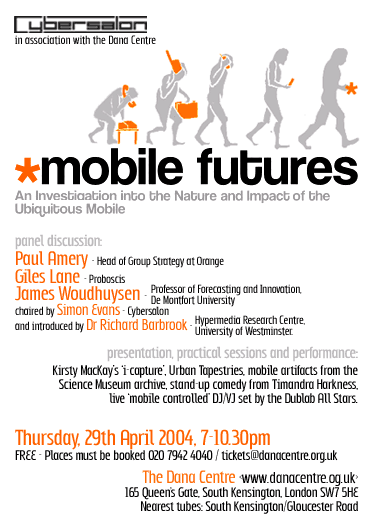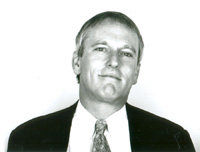ABOUT 'MOBILE FUTURES'
VIEW THE LIVE STREAM HERE (29th April 2004, 7-10.30pm)

In November 2000, Cybersalon ran an event at the Institute of Contemporary Arts (ICA) on the theme ‘Mobile Futures’. We produced our own ‘Mobile Manifesto’ (below) as the basis for the discussion. Now, over three years on, Cybersalon revisits the theme to explore how the reality of mobile phone and wireless technologies has actually shaped up.
The event is structured around a panel discussion featuring academic, commercial and artistic perspectives on the theme, illustrated through presentations, practical sessions and performance and interspersed with a variety of visual, sound and online interstitials that add dimension, and contribute in a small way to an exploration of the 'aesthetics of mobile culture’.
Cytbersalon’s Mobile Manifesto
1.0 Is WAP crap?
Early adopters can only access the pleasures of new technologies by accepting
the pains of beta-testing the future.
2.0 When will the hardware come up to speed?
Net users assume that large screens, colourful icons, pop-down menus and
all the other features of the PC interface should be available on mobiles
which are small enough to fit into their pockets.
3.0 Has my SIM card become my identity?
Even if we forget what we did yesterday, our mobiles have recorded all
aspects of our daily lives: who we spoke with, what we bought and where
we were.
4.0 What shall I broadcast tonight?
With the advent of 3G mobiles, everyone will carry a television transmitter
in their pocket for video-conferencing with work colleagues, providing
live-feeds to the Net and swapping MPEG movies with their friends.
5.0 Is your partner monitoring your visits to
your lover?
While we appreciate being able to find out where we are using the GPS
facilities on our mobile, we don’t want other people knowing where
we are without us telling them first.
6.0 How did I ever leave home without one?
Wherever we go, we are carrying our own intimate world of friends, colleagues
and contacts inside the screens of our mobiles.
7.0 Who said that text was dead?
The popularity of SMS disproves McLuhan’s prediction that reading
and writing would disappear once we could easily communicate with each
other using audio-visual media.
8.0 Will we ever develop manners for mobiles?
The happiness of hearing from an absent friend means ignoring your best
mate who is sitting right next to you.
9.0 Is my mobile acting as a double-agent?
By becoming my easy-to-use gateway for on-line banking, m-commerce and
socialising, my mobile is surreptitiously revealing information about
my finances, shopping habits and lifestyle choices to outside forces,
such as law enforcement agencies and market researchers.
10.0 Are we frying our brains instead of polluting
our lungs?
For today’s young people, the first sign of maturity is ignoring
the danger of radiation from mobiles rather than disregarding the risk
of getting cancer from cigarettes.
Andrew Purdy, Armin Medosch, Mark Fitzpatrick, Niki Gomez, Richard Barbrook, Robin Hamman, Sophia Drakopoulou
7th November 2000
Contributors
Urban Tapestries
Urban Tapestries is a transdisciplinary research project exploring social
and cultural uses of the convergence of place and mobile technologies
as well as building an experimental platform for authoring and accessing
place-based content (text, audio and pictures). It is a framework for
exploring and sharing experience and knowledge, for leaving and annotating
ephemeral traces of peoples’ presence in the geography of the city.
Our software platform allows people to author their own virtual annotations
of the city, enabling a community’s collective memory to grow organically,
allowing ordinary citizens to embed social knowledge in the new wireless
landscape of the city.
Timandra Harkness
<www.timandraharkness.com>
Timandra chairs and speaks at public events on scientific and cultural
themes. She is particularly interested in the current obsession with getting
Art and Science into bed together. A regular panelist on BBC4’s
MIND GAMES, she can also be seen on BBC Open University’s THE NEXT
BIG THING, discussing the elusive Theory of Everything. Timandra writes
for print publications including the Sunday Times, Telegraph, and Motorcycle
Voyager magazine. Online publications include Spiked-online and the Guardian
online. She is a member of the Association of British Science Writers.
Biographies
Panellists:
Paul
Amery
Head of Partner Strategy, Orange
Paul Amery is Head of Partner Strategy for Orange – one of the UK’s
leading Mobile Operators. Paul is currently responsible for the Group
Developer & Partner Programme and is charged with defining Orange’s
global strategy. He recently launched Orange's first global developer
site <www.developers.orange.com>.
Paul is also Orange’s lead authority on wireless developer platforms (Symbian, Sun, Saveje, Palm and Microsoft), and has previously been Orange’s industry standards representative (JCP, 3GPP and WAP, Forum).
Before Orange, Paul worked in Motorola R&D and Novell R&D on mobile platform research and started his career as a Windows C++ programmer.
Giles Lane
Proboscis
<www.proboscis.org.uk>
Giles founded Proboscis in 1994 and chairs the board of directors. He manages the company with Alice Angus and leads the SoMa research programme.
Giles founded and edited COIL journal of the moving image between 1995 and 2000, and co-edited and published Ghost Stories by Pavel Buchler in 1999. He initiated, developed and produced Mapping Perception (a 35mm film, immersive installation book and CD-ROM) between 1998 and 2002, and conceived the DIFFUSION eBook format. Giles initiated and co-developed the Topologies initiative, which led to the establishment of the SoMa think tank in late 2000.
In 2001 Giles founded the Peer2Peer Network and curated and produced Private Reveries, Public Spaces. He also commissioned and edited the DIFFUSION eBooks series, Species of Spaces (2002/2003). Giles is currently leading the development of the location-based wireless project, Urban Tapestries as well as consulting for clients such as IDEO, Arts Council England and NESTA.

Professor James Woudhuysen
Professor of Forecasting and Innovation, De Montfort University
James Woudhuysen, a physicist, editor/co-author of several books and Professor of Forecasting and Innovation at De Montfort University, is an international forecasting guru.
In the early and mid 1990s, James led consulting in IT at the Henley Centre for Forecasting, where his clients included AT&T, BT, Bull, Compaq, IBM, Motorola, and US West. He went on to manage worldwide market intelligence for Philips consumer electronics in the Netherlands, and to work as a director of the product designers Seymour Powell.
James Woudhuysen helps clients to master new trends among consumers, retailers and competitors, so as to implement major shifts in corporate strategy, marketing, branding and design. He makes predictions about the future of IT and e-commerce and interprets popular culture for clues to future design and business trends.
Chaired by:
Simon Evans
Cybersalon
Simon is a digital artist with a background television production and technology marketing. A graduate of the MA in Hypermedia at Westminster University, Simon’s career has included positions such as Multimedia Producer at interactive media design agency Romandson and Marketing Director of kiosk integration company Datasphere.
Simon’s experience of mobile technology goes back to the early days of WAP, with a location based role-playing game developed in association with Ericsson entitled The Territory. This project was presented at the Cybersalon 2000 Mobile Futures Event but, like the technology itself, proved to be ahead of its time. The renewed interest in the creative potential of wireless media has led to Simon recently speaking at the Urban Wireless workshop at FACT in Liverpool.
Simon’s work is concerned
with the creation of knowledge and meaning within the narratives of landscape,
both urban and rural. These interests lie at the boundary of business,
creativity and popular culture. His paper on the new digital technologies
of marketing, The Mathematics Of Desire, is soon to be published online
by the Hypermedia Research Centre.
Introduced by:
Dr. Richard Barbrook
Hypermedia Research Centre, University of Westminster
<www.hrc.wmin.ac.uk>
Dr. Richard Barbrook was educated at Cambridge, Essex and Kent universities.
During the early-1980s, he was involved in pirate and community radio broadcasting. He helped to set up Spectrum Radio, a multi-lingual station operating in London, and published extensively on radio issues.
In the late-1980s and early-1990s, Richard worked for a research institute at the University of Westminster on media regulation within the EU. Some of this research was later published in 'Media Freedom: the contradictions of communications in the age of modernity' (Pluto Press, London 1995).
For the last few years, Richard has been coordinator of the Hypermedia Research Centre at the University of Westminster and was the first course leader of its MA in Hypermedia Studies. In collaboration with Andy Cameron, he wrote 'The Californian Ideology' which was a pioneering critique of the neo-liberal politics of 'Wired' magazine.
At present, Richard is preparing 'The Cyber-Communist Manifesto' for publication as a book.